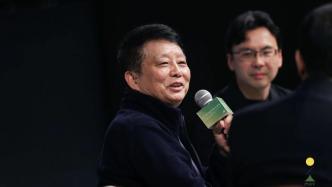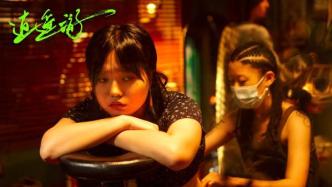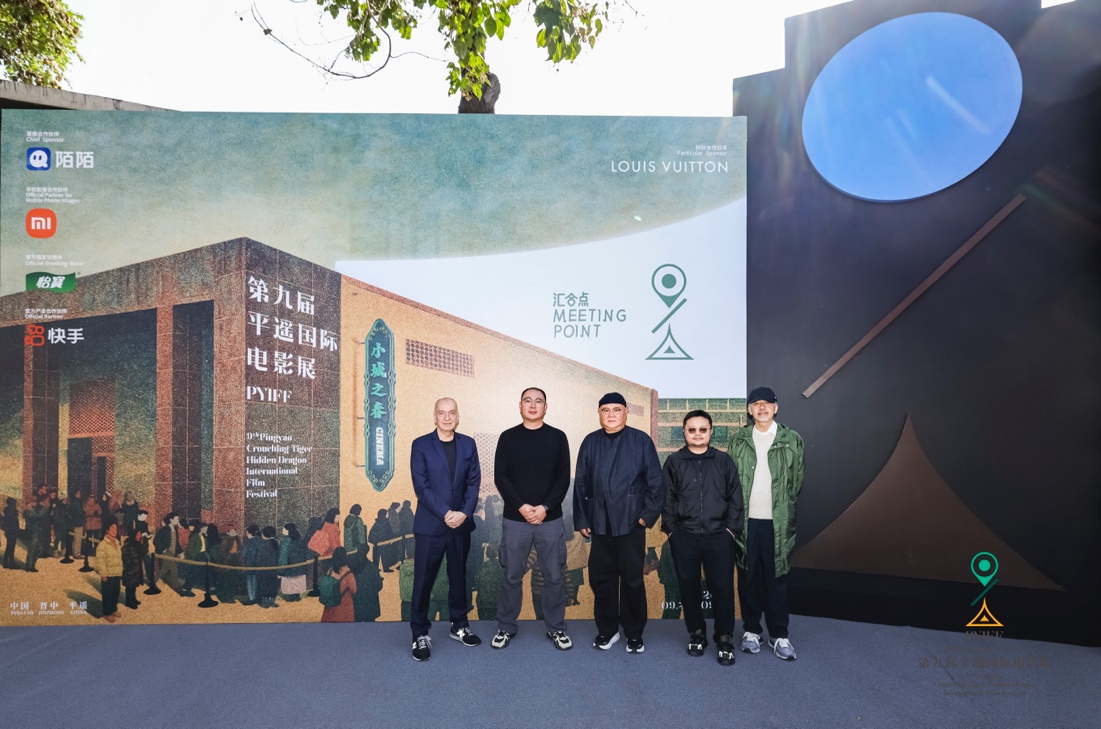
At the end of September, the autumn sun in Pingyao Ancient City was still scorching, and the enthusiasm of movie fans was also "as high as the sun in the sky".
At the 9th Pingyao International Film Festival's "Handshake at This Moment" master dialogue event, filmgoers braved the scorching sun to hear three Chinese directors, winners of honors at this year's three major European film festivals, share their creative work. Berlin Film Festival Best Director Huo Meng ("The Land of the Living"), Cannes Special Prize winner Bi Gan ("Wild Times"), and Venice Film Festival Best Actress winner Cai Shangjun ("Sun in the Sky"), joined by Cannes Film Festival Director Christiane Jean and Berlin Film Festival Program Planner Wang Qingqiang, moderated by Jia Zhangke. The conversation ranged from the origins of their work to international exchange, from cinematic expression to supporting future generations, painting a vivid picture of the current landscape of Chinese-language filmmaking.

From left: Christiane Jong, Huo Meng, Cai Shangjun, Bi Gan, and Wang Qingqiang
Each of us is working hard to build a bright future for Chinese-language films.
"This year, young Chinese directors are experiencing a remarkable creative explosion." Jia Zhangke, moderator of the dialogue and founder of the Pingyao Film Festival, highlighted the special significance of this gathering at the outset. In February, Huo Meng won the Berlin Film Festival's Best Director award for "The Land of the Living," Bi Gan won the Cannes Special Prize for "Wild Times" in May, and in September, Cai Shangjun's "Sun in the Sky" helped Xin Zhilei win the Venice Film Festival's Best Actress award. "This is the first time a Chinese film has won awards at all three major European film festivals in the same year. This achievement gives us great confidence in the creative power of Chinese-language films."
Jia Zhangke summarized the creative characteristics of the three as "each with their own unique edge, yet all keeping their original aspirations." He frankly stated that Huo Meng's work "carries the warmth of the land," and from "Crossing the Zhaoguan Pass" to "The Land of the Living," it is always rooted in the changing times of rural China. This "reverence for the lives of ordinary people" gives his work the power to transcend culture. When evaluating Bi Gan, he mentioned that "Bi Gan's lens has a uniquely Chinese poetic quality," and from the long-shot experiments in "Roadside Picnic" to the dream-like narratives in "Wild Times," he is constantly exploring new possibilities in film language. "This kind of artistic courage is what international film festivals like Cannes cherish." As for Cai Shangjun, Jia Zhangke believes that her creative transformation "precisely captures the changing mood of the times," and from the social criticism in "People Mountain People Sea" to the inner concern in "Sun in the Sky," "it demonstrates a mature director's continuous questioning of human nature."
Although the three directors' road to winning awards at the three major film festivals began in different creative soils, they all have a sincere and unique expression of film.
"The Land of Habitat" is rooted in the director's hometown of Henan. It is a "roots-seeking work" that he completed after "Crossing Zhaoguan" after spending several years reading anthropology books and visiting villages.

Director Huo Meng
"I made 'Land of Habitat' to document the thousands-year-old emotional connection between the Chinese people and the land," Huo Meng said. "We are an agricultural country, and our food, clothing, housing, and transportation all come from the land. In the 1980s, villages still maintained farming methods dating back to the Qin Dynasty. But with the advent of mechanization and technology, young people have become the breadwinners of families, and traditional relationships of filial piety and love for the elderly are undergoing subtle changes. But those qualities of hard work and resilience remain, and I wanted to capture these 'confrontational moments', both to trace our roots and to reflect on the present."
At the Cannes International Film Festival, Bi Gan's "Wild Times" was shortlisted for the main competition at a fast pace, "almost before the press conference," and ultimately won the Special Award. This work, focusing on the "boundary between dreams and reality," continues Bi Gan's exploration of images since "Roadside Picnic" and achieves new breakthroughs in industrial production and artistic expression.

Director Bi Gan
Ever since "Roadside Picnic," Bi Gan has been a rising star on the international film scene. Returning to Shanxi, the director, a graduate of Shanxi Media College, recalled his student days of lugging USB drives to film festivals to select films, jokingly saying, "Procrastination started then." Bi Gan also recounted the initial budget constraints of "Roadside Picnic," and the need to return to school to get the camera. "Before making "Roadside Picnic," I went through a very confusing period, much like many young creative professionals."
Talking about the creation of his new film, Wild Times, he quoted Baudrillard: "In the past few years, the world has been falling, reality and illusion are difficult to distinguish, and dreams are human instincts - primitive people had no light at night, and their brains relied on dreams to maintain vision. The meaning of movies and dreams is very similar. I want young people to see the light of movies even in the darkness."
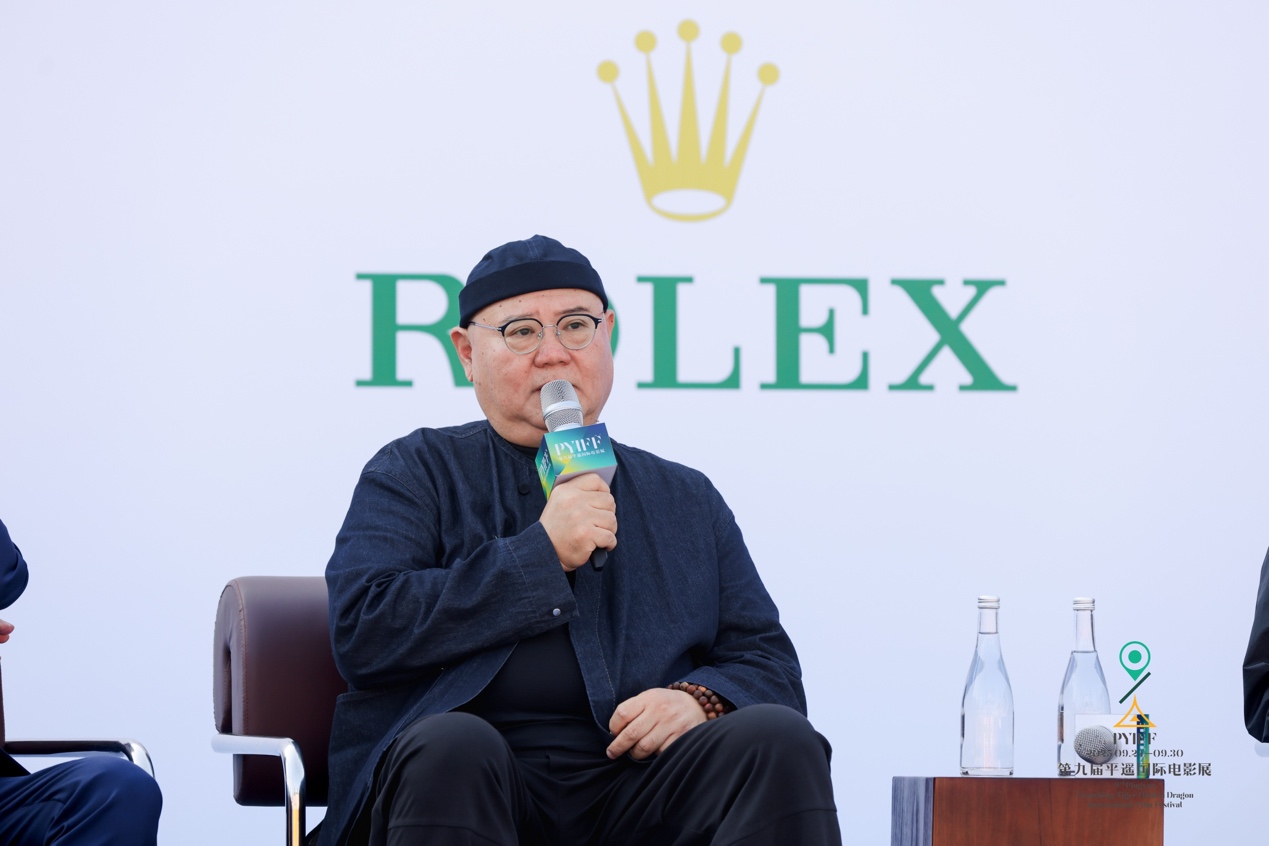
Director Cai Shangjun
At the Venice International Film Festival, which just concluded in September, Cai Shangjun's film "Sun in the Sky" won a long-awaited honor for a Chinese actress. Xin Zhilei, for her role as Meiyun, became the first Chinese actress to win Best Actress at the Venice Film Festival in 14 years. For Cai Shangjun, this was a "second reunion" with Venice: he had previously won the Best Director award for "Crowd Mountain, Crowd Sea," and "Sun in the Sky" was a key work that marked a shift in his career.
"My first two works were critical of society and indignant about the ups and downs of ordinary people. After the pandemic, I wanted to focus more on the 'suffering of the heart.'" Cai Shangjun admitted that he was initially worried that "Chinese emotional ethics would be difficult for Western audiences to understand," but after the Venice screening, he found that "the commonality of pain and joy in human nature allows audiences from different cultural backgrounds to empathize."
Why the three major film festivals favor these Chinese stories
At the masterclass, in addition to the creators’ personal experiences, the selectors of the Berlin and Cannes Film Festivals also provided perspectives and evaluations from international film festivals.
Wang Qingqiang, the Asian film selector for the Berlin Film Festival, recalled that when he received the film last June, he identified "The Land of Habitat" as "a work with a grand theme that sees the river of life through rural experience." As a new director who had just directed two feature films, Huo Meng rushed directly into the main competition for his first Berlin Film Festival nomination, which is not a common practice. During the Berlin Film Festival screening, Huo Meng's most profound feeling was that "whether it was the media, film critics or audiences, they all deeply loved the characters in the film. They could feel the deep affection between the land and Chinese farmers, as well as the Chinese-style forbearing but strong family affection." This cross-cultural resonance is precisely the core code for the film's award.
From "The Last Night on Earth" to "The Untamed," Bi Gan's connection with Cannes runs even deeper. Christian Jean, the Cannes Film Festival's film director, recalled the surprise of "The Untamed": "It arrived just before the press conference when we were selecting the films, but after watching it, I felt like I'd never seen anything like it before. Director Bi Gan takes us on a journey through dreams, visually stunning and with a strong personal narrative style. Screening it on the big screen at the Grand Theatre in Cannes was a unique experience, as if I were entering his dreamland with the audience."

Stills from "Wild Times"
Both film selectors mentioned the post-pandemic resurgence of Chinese-language films. Wang Qingqiang, a longtime follower of Chinese-language filmmaking, said, "My biggest impression of Chinese-language films is their vibrant creative energy." He remembered the years during the pandemic, when everyone was talking about how difficult things were. When chatting with directors, they'd sigh after only three sentences. But "even after all that sighing, the films were still made, and I think that's a great honor." Wang Qingqiang also noted his close attention to creative work across Asia, saying, "Chinese directors are now more creative than even those in Japan and South Korea." Christian Jean also lamented, "A few years ago, there were fewer films submitted, but now there are more, and we can see the dynamism of young people. Cinemas are where these new forces are growing."
A sincere message to young creators
"I make movies because I enjoy making them, not because the industry is booming." When asked by a freshman, "What should I do if I encounter difficulties while filming?", Bi Gan gave a straightforward and resolute answer: "I make movies because I enjoy making them. That's why I choose to be a director and why I work with a group of people who love making movies. It's not because the industry is booming that we choose to make movies. It's just because we're interested in it. So, under this premise, this question becomes even more meaningful."
"Wild Times" also took many years to finally be filmed. Bi Gan admitted, "While filming 'Wild', many colleagues and people outside the industry would ask me, 'Your industry is so bleak, what are you doing?' I subconsciously answered them that all difficulties should not be put in advance. Filmmaking is about overcoming all difficulties. Sitting here with you today is to let everyone see our efforts in the international arena, and to work hard to help everyone gradually regain their lost confidence in the film industry."
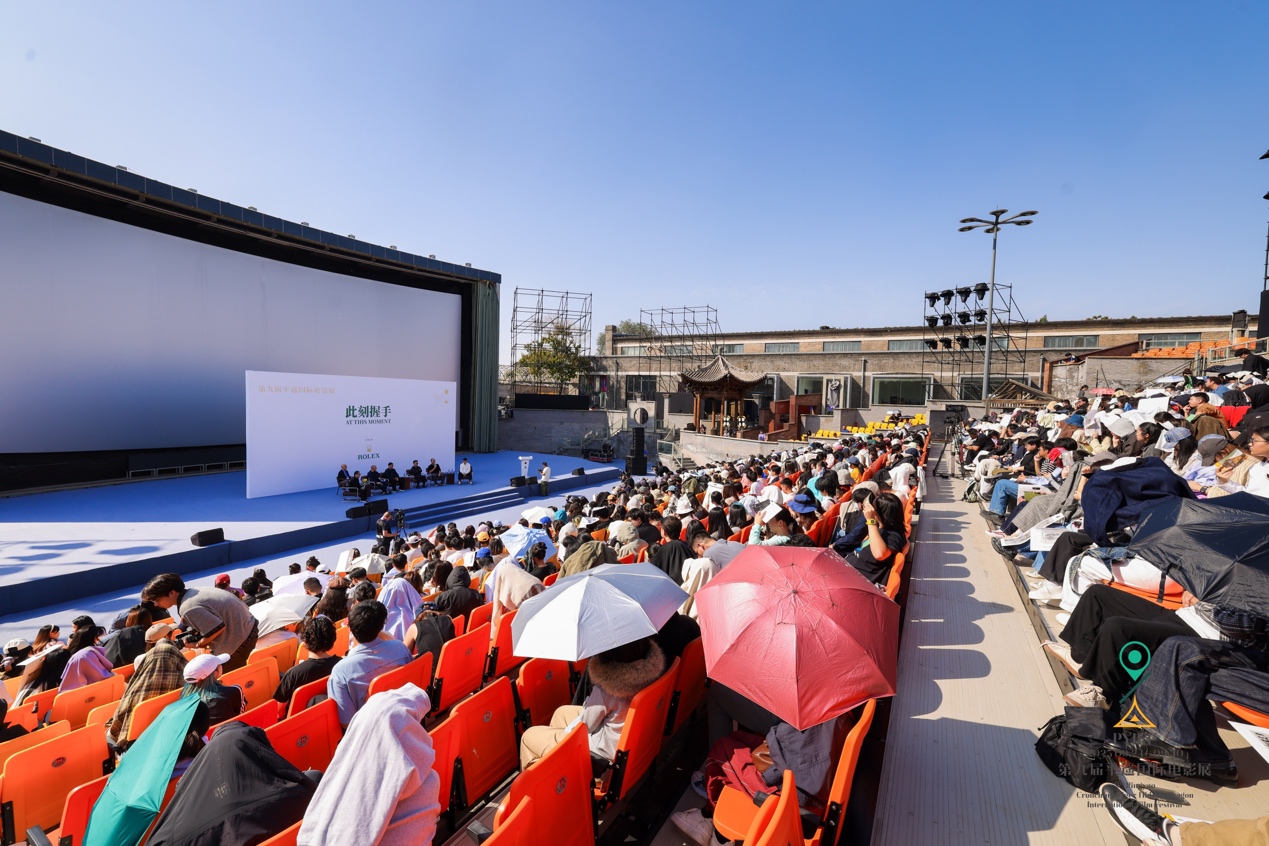
Master class event
When asked if popularity is a factor in casting, the three directors reached a consensus. Bi Gan, discussing his collaboration with Yi Yang Qianxi, said, "We were both introverted the first time we met. We didn't speak for an hour, and I knew it was a hit—he understood the character's fascination. Popularity is a plus, but excellence is a prerequisite." Cai Shangjun added, "Directors don't know how to act; it's up to the actors to convey their feelings. First, the character fits, then popularity is considered. Otherwise, the actor and the character become detached, and a good film won't be made."
Huo Meng shared his experience of selecting non-professional actors: "For 'The Land of the Living', we were casting nine-year-olds. We looked at over ten thousand actors before finally choosing 'young Tony Leung Chiu-wai'. When filming rural scenes, the extras naturally got into the mood, and I felt useless. Finding the right person is more important than anything else."

Stills from "The Land of the Living"
Regarding the confusion of "life being dull and lacking inspiration" and "inspiration failing to become a story," Cai Shangjun quoted Canadian writer Munro: "It's not about discovering stories, but looking at the everyday with new eyes. A cup, a beam of light, find the hidden connections between people and objects, and stories will emerge." Bi Gan encourages "trusting fragments": "Turning fragments of inspiration into a script, the structure will slowly emerge." Huo Meng advises "reading more and identifying your strengths." "Film is a tool for understanding yourself. Find a direction and persevere, and you will naturally meet like-minded audiences."
When discussing how to avoid exploiting suffering, Cai Shangjun remarked forcefully, "The audience can sense your sincerity. If you have empathy and compassion for the characters, your work will have warmth; if it's just wishful thinking, the audience will see through it immediately." Huo Meng also emphasized, "As long as you love the land and respect ordinary people, you'll find your creative groove, and those moving emotions will flow naturally."
